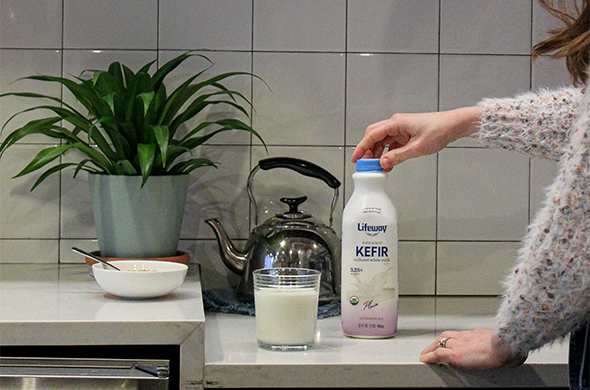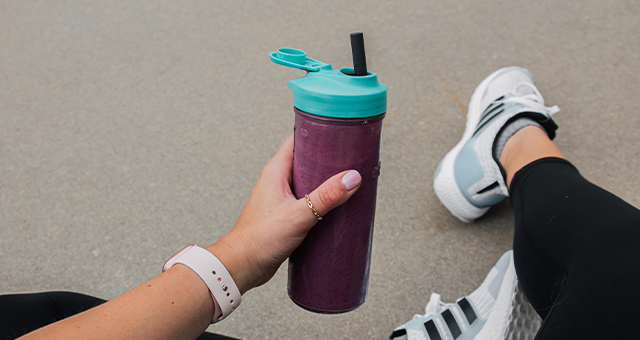The fall season is an excellent time of year to take stock of your immune-supportive choices within your daily routine. Making just a handful of changes can yield many health benefits to keep your immune system and overall health in check all fall and winter long. This is also a great time of year to look at your overall lifestyle choices to make sure they’re in alignment with your health goals. So we rounded up some of our favorite tips for the autumn equinox to help you make sure all your bases are covered for optimal wellness when it comes to immune system care.

Get The Sunshine Vitamin: Vitamin D:
Vitamin D is a unique vitamin that can be produced by our body with exposure to the sun or a portable light device with ultraviolet rays. However, cloudy and cold days or the risk of sunburn can often impede getting enough sun exposure to produce enough, making it important to get it through our diet and/or supplement choices. The best food sources of vitamin D include dairy products, fatty fish such as salmon and tuna, and mushrooms and eggs. Not only is vitamin D critical to bone health, but it’s an important vitamin for our immune system, mental health, gut health, and sense of overall well-being. Vitamin D works by helping our white blood cells produce compounds to fight invading pathogens and may reduce disease-causing inflammation in our bodies. Studies have shown vitamin D has a positive impact on preventing and lessening symptoms of respiratory viruses, may decrease our risk for autoimmune diseases, and may improve response to antiviral treatments.
Balance Your Gut With Fermented Foods:
Our immune system and reducing inflammation in the body is often top of mind, especially during the fall and winter seasons when we may be more prone to illness. The gut plays an integral role in protecting against pathogens and viruses. Just as your skin protects you against foreign invaders on the outside, the gut lining protects the inside of your body helping to combat bad bacteria from our diets, the environment, viruses, and more. We know that 70-80 percent of the IG-producing (immunoglobulin-producing) cells that make up the immune system are located in the gut, making it the body’s largest site of immunological response. This acts like a wall of protection against said harmful pathogens.
When our microbiome is out of balance, the condition is known as dysbiosis. Dysbiosis may adversely affect our immune system leaving us susceptible to infections and disease, along with feeling unwell and chronic inflammation, which can trigger more illness making it a vicious cycle. However, you can take back control by optimizing your diet with a range of fermented foods such as Lifeway Kefir and Farmer Cheese, which may help balance our microbiome, making them a vital part of our immune-boosting toolkit to keep us healthy. In fact, research shows that live probiotics and bioactive compounds in fermented foods such as Lifeway Kefir have a positive impact on the health of people with flu-like respiratory tract infections by boosting the immune system and response.

Get Your Fill Of Antioxidants, Vitamins, and Minerals:
Antioxidants, vitamins, minerals, and phytonutrients (flavonoids, polyphenols, and carotenoids) are found in a variety of fruits and vegetables, as well as in certain dairy products and other animal products. They include vitamin C, vitamin E, B vitamins, lycopene, beta-carotene, selenium, magnesium, calcium, and potassium, just to name a handful. Antioxidants, vitamins, and minerals work to round up free radicals in our body, fight infections, and support brain and gut health, blood pressure health, and overall health. This helps your body function at optimal levels to keep you stronger and help fight off disease more easily. Eating a colorful variety of fruits and vegetables, as well as healthy lean proteins, and healthy fats from nuts, seeds, and fish, encourages a balanced, nutrient-dense diet to help build a strong immune system—and a healthier, happier you!
Get Enough Zinc In Your Diet:
Zinc is an important mineral that our body needs for a strong immune system. Not only does zinc play a role as an antioxidant in the body, but it is also integral for wound healing and immune function. Zinc is critical for the normal development and function of our immune cells, including macrophage development, phagocytosis, and cytokine production, which are all important for combating invading pathogens. When a zinc deficiency occurs, the body’s immune cells can’t function properly to fight disease and inflammation. Certain people will need to ensure they get enough of this vital nutrient since it isn’t available in all foods. These individuals include vegetarians, pregnant women, those who have irritable bowel syndrome (IBS), inflammatory bowel disease (IBD), and individuals with celiac disease. Zinc can be found abundantly in seafood, beef, chicken, turkey, and dairy products, along with nuts, seeds, and fortified whole grains and cereals.

Consume a Wide Range of Fruits, Vegetables, Legumes, And Whole Grains:
The staples of a healthy diet are rich in fruits, vegetables, legumes (beans, peas, lentils), and unprocessed whole grains. Not only do they provide a wide array of antioxidants, vitamins, and minerals to support a healthy immune system, but they also provide our body with insoluble and soluble dietary fiber, which is critical for feeding and encouraging the growth of the good bacteria in your gut that protects you from illness. Without sufficient fiber, your gut will not function optimally. Certain types of insoluble and soluble fibers act as prebiotics that are fuel for your microbiome, which then produces short-chain fatty acids (SCFA), important compounds for a working immune system. Fiber is not found in animal foods, so be sure you get adequate amounts of whole food plant-based nutrients in your daily diet to ensure your body can produce the optimal levels of good bacteria you need to thrive.

Stay Hydrated:
It goes without saying that water is a vital part of life. It’s the most abundant substance in the human body, making it our body’s most essential nutrient. Every part of our body needs water to function properly – our organs, cells, tissues, and life-sustaining processes, including our immune system. Water transports nutrients along with oxygen to our cells and carries waste and toxins away. Proper hydration also helps our body’s digestive system as well as preventing pathogens from getting into our nose, mouth, and eyes. Without enough water in our bodies, our systems will not work properly to stay healthy. Drink water and consume water-rich fruits and vegetables throughout the day.
Do Whatever it Takes to Get Enough Sleep:
Sleep plays an important role in our immune function! During sleep, the body produces cytokines, which is a type of protein that targets pathogens and reduces inflammation in our body. While we sleep we also produce necessary hormones and our bodies go through a critical detoxification process that doesn’t happen when we short ourselves of enough rest. Think of sleep as your daily superpower just waiting for you. All you have to do is get enough! If that’s not enough motivation for you. Get this: Sleep deprivation causes a decrease in cytokine production, as well as infection-fighting antibodies leaving us susceptible to flu, colds, and viruses. Ready to hit the hay yet? Check out our post here for more help!
Stay Active And Exercise:
Not only does physical activity promote heart health, a healthy weight, and sleep, but it also supports a healthy immune system. Research has shown that exercise improves the anti-pathogen activity of macrophages (cells that fight pathogens), as well as enhances the circulation of disease-fighting and anti-inflammatory proteins, including immunoglobulins and cytokines. Exercise also increases the circulation of our white blood cells to fight invading pathogens.
